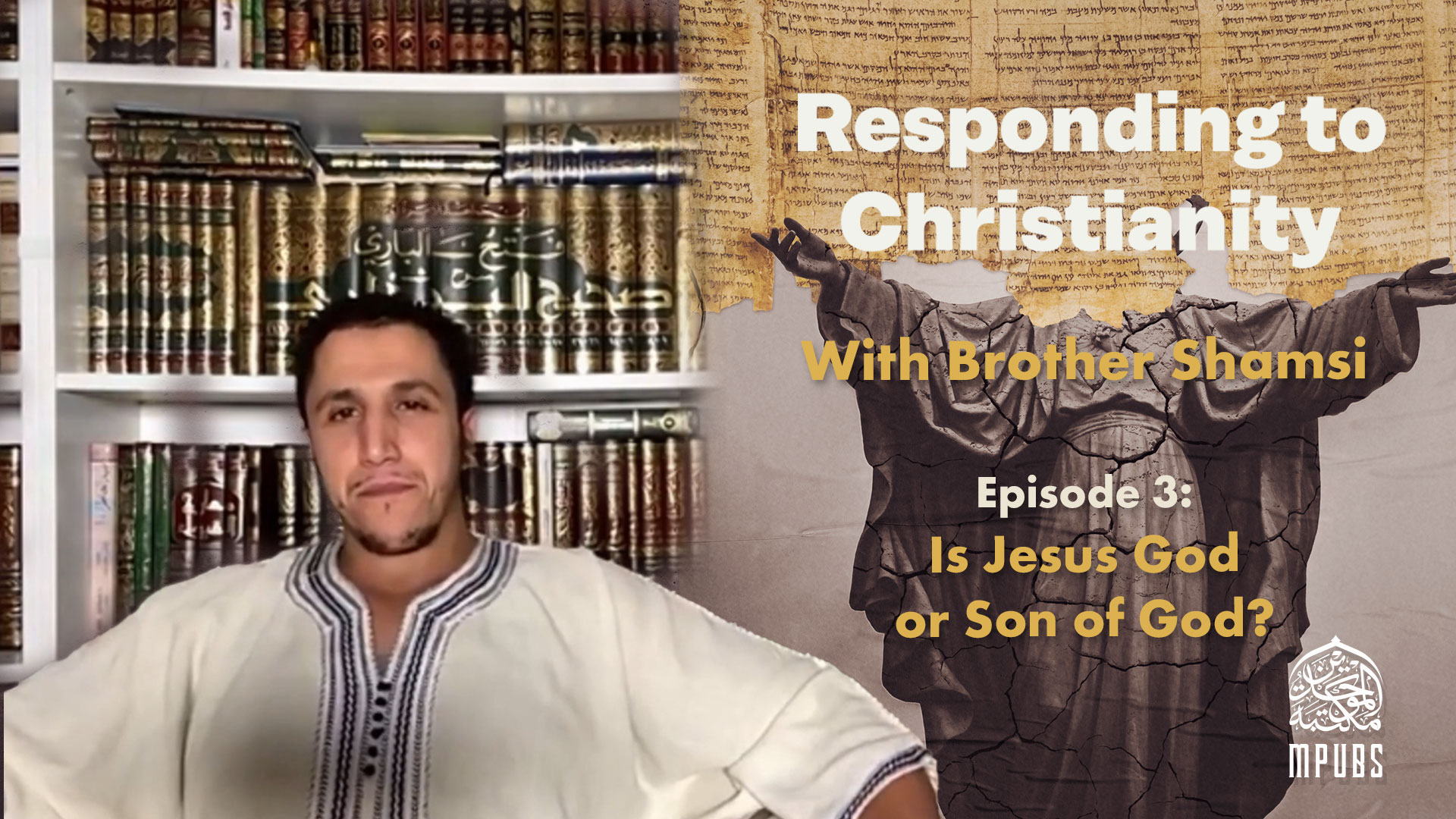Bismillāh wa-Alḥamdulillāh wa al-Ṣalātu wa al-Salām ʿalá Rasūl Allāh ʿamma baʿd
On Saturday 22nd August 2020 Muwahhideen Publication began a series of podcasts aimed at equipping the regular Muslim with the knowledge to respond to the misguidances of Christianity in their effort to call those around us to Islam. In this series our brother Abū Zaynab Yūsuf Dīab interviews our brother Abu ʿĀ’isha Shamsidīn clarifying several pertinent questions on each sub-topic, The series consists of 5 episodes:
- Introduction
- Was The Bible Changed and How
- Is Jesus God or Son of God
- Did Jesus Preach The Trinity
- Was Muhammad Prophesized In The Previous Scriptures
So we invite our brothers and sisters to join us in this simplified this knowledge-based weekly class.
We ask Allāh to allow us to benefit and to implement the best of what we learn.
Tune in to the LIVE Video Stream via:
Tv Mpubs: Tv.Mpubs.org
In Shāʾ Allāh Taʿālá
Wa Billāhi Tawfīq
Review the previous episodes below:
[Episode 1] – 22.08.2020
The Introduction
[Episode 2] – 05.09.2020
Has The Bible Changed and How
In this the second installment in the series the points that were covered are:
- The origin and meaning of the word Bible.
- They difference between the Injīl that we Muslims believe in and the present day ‘Bible’
- How to respond to the doubt that Muslims should believe in the Bible.
- Was the Bible written down in ʿĒsà (عليه السلام ) time?
- Quotes from several Non Muslim scholars including Bart Ehrman in his two books “Lost Scriptures: Books that didn’t make it to the New Testament.” And “Misquoting Jesus: The story behind who changed the Bible.” As well as – John Mill and Daniel Wallace
- Some differences between the Old Testament and the New Testament
- The fact that present day Christians only use the Old Testament to provide Prophecies about ʿĒsà (عليه السلام ).
- The difference between James (one of ʿĒsà’s true followers) and Paul, who never met ʿĒsà (عليه السلام) and the disputes between Paul and the true followers of Ēsà.
- Acknowledging the different versions of the Bible and using the difference in their contents to prove that the Bible has been changed.
- The discovery of manuscripts that didn’t make it into the Bible; the Gospel of Mary, the Gospel of the Nazarenes, the Gospel of the Egyptians.
- The difference between the two types of mistakes in the Bible; intentional and unintentional, and how the mistakes in the scriptures were passed down from scribe to scribe.
- Christian scholars discover 30,000 contradictions in the Bible.
- The significance that Paul and other authors of the Gospel never met ʿĒsà (عليه السلام ) and that they never thought their writings would be used as ‘Divine Scripture,’ nor can any of the writings be traced to it’s Author.
- The fact that the authors of the Bible never claimed to have received Divine Inspiration.
- The difference between the Qur’ān that Allāh (سبحان و تعالى ) promised to preserve and the Bible that has not been preserved as well as the blessing of the Isnād.
[Episode 3] – 15.10.2020
Is Jesus God or Son of God?
In this the third installment in the series the points that were covered are:
- Do all modern day Christians believe that ʿĒsà (عليه السلام) is God or son of God?
- The fact that Christian scholars differ regarding whether ʿĒsà (عليه السلام)’ death’ brought salvation, and whether ʿĒsà died or not.
- The fact that Christians differ regarding the meaning of the term ‘son of God’ and whether it is literal or metaphorical.
- The different meanings of the word ‘son’ (the offspring of a mother and father, an old man referring to a young man and a step son), which one do the Christians use when referring to ʿĒsà (عليه السلام).
- Tips when giving daʿwah, -ask which meaning of the word ‘son of God’ the opponent believes in
- Focus on proving that ʿĒsà (عليه السلام) is not the literal son of God. -Explanation of Bible verse: (Numbers 23: 19) “God is not the son of Man.”
- The fact that Allāh (سبحانه و تعالى) has perfect Attributes and ʿĒsà (عليه السلام) had the attributes of a human being that contained deficiencies. For example ʿĒsà did not know ‘the hour.’
- The use of the term ‘Father’ in Christianity and the meaning of the Bible verse ‘The only True God is The Father -Quotes from Non Muslim scholar Bart Ehrman explaining the historical change in the concept of ʿĒsà (عليه السلام) and how ʿĒsà (عليه السلام) went from being a Prophet according to the early Christians to being elevated to the stature of ‘God.’
- The difference between the ‘historical Jesus’ and the ‘theological Jesus.’ -Dale Martin, a Christian scholar admits: “we can not prove Jesus to be God from a historical point of view.”
- The significance of the Jews saying: “we killed your Messiah.” Had ʿĒsà (عليه السلام) preached that he was God, they would have said: “we killed your God.”
- The difference between ‘god’ with a lower case g and ‘God’ with a capital G in the Bible.
- The explanation of Bible verses: Jesus said, “At my Father’s direction I have done many good works. For which one are you going to stone me?” They replied, “We’re stoning you not for any good work, but for blasphemy! You, a mere man, claim to be God.” Jesus replied, “It is written in your own Scriptures that God said to certain leaders of the people, ‘I say, you are gods!’ (John 10: 32-34)
- The Islāmic perspective from Ibn Kathīr (رحمه الله تعالى) in his Tafsīr (Sūrah An-Nisā: 157-158) of how the Christians split into 3 groups after Allāh (سبحانه و تعالى) raised ʿĒsà (عليه السلام) to the Heavens. “They then divided into three groups. One group, Al-Yaʿqūbiyyah (Jacobite’s), said, ‘Allāh remained with us as long as He willed and then ascended to heaven.’ Another group, An-Nasturiyyah (Nestorians), said, ‘The son of Allāh was with us as long as he willed and Allāh took him to heaven.’ Another group, Muslims, said, ‘The servant and Messenger of Allāh remained with us as long as Allāh willed, and Allāh then took him to Him.’ The two disbelieving groups cooperated against the Muslim group and they killed them. Ever since that happened, Islām was then veiled until Allāh sent Muḥammad.(ﷺ)






 We at Muwahhideen Publications are an Islaamic Organization founded in the Caribbean Island of Tobago, Trinidad &Tobago and dedicated to propagating the pure Islaamic creed, based on the correct and authentic teachings of the Qur'aan and the authentic Sunnah, according to the understanding of the pious predecessors i.e. the first three generations of Islaam and those who follow their way until the day of judgement.
We at Muwahhideen Publications are an Islaamic Organization founded in the Caribbean Island of Tobago, Trinidad &Tobago and dedicated to propagating the pure Islaamic creed, based on the correct and authentic teachings of the Qur'aan and the authentic Sunnah, according to the understanding of the pious predecessors i.e. the first three generations of Islaam and those who follow their way until the day of judgement.
You must be logged in to post a comment.